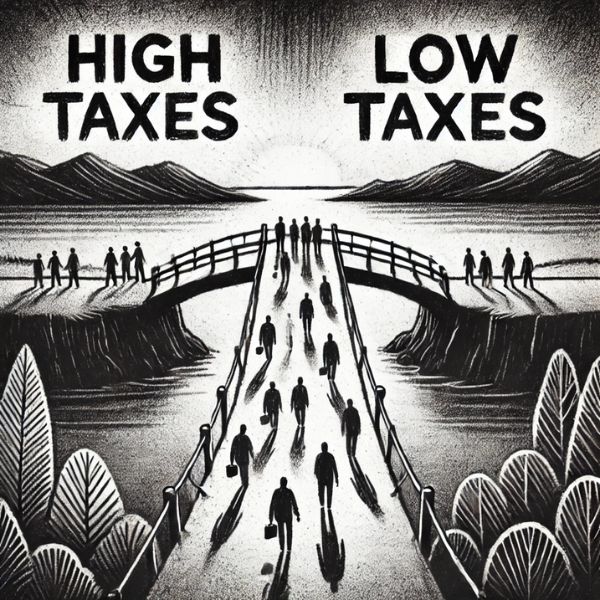In today’s Europe, surrealism isn’t just Dalí’s legacy; we’re living it firsthand with policies that feel ripped straight out of a dystopian manual.
Take the so-called “15-minute cities,” marketed as the sustainable future but in reality limiting your freedom under the guise of reducing emissions. Meanwhile, equality ministries, backed by multi-million budgets, justify their existence with absurd initiatives like campaigns against “micromachisms” at home. The result? A massive bill that, surprise, lands squarely on you—the average taxpayer.
Still don’t see it? Let me make it crystal clear: every euro funding these sociopolitical experiments doesn’t fall from the sky—it comes straight from your pocket. Yes, from the taxes you dutifully pay with the promise of improved public services that, let’s be honest, are still nowhere to be found. While your paycheck barely stretches, the European Central Bank plays apprentice wizard with interest rate cuts to patch the holes of German recession and French decline. Spoiler alert: these patches fix nothing, and you’re still footing the bill.
Inflation—the silent predator of your purchasing power—isn’t your only enemy. The fiscal laws, akin to a horror movie script, tie your hands as well. You work harder, earn less, and every cent you produce seems destined to sustain a system that doesn’t work for you but perpetuates its own failures.
So, what can you do? Keep waiting for the mythical European economic miracle to materialize (spoiler: it won’t) or take control of your finances and explore alternatives. This is where Ireland and Cyprus step in. Without grandiose promises, these countries offer tax systems that actually work. In this fiscal comparison between Ireland and Cyprus, we’ll dive into how these destinations can become your allies in reclaiming control over your finances.
In this blog, we’ll delve into how you can break free from this fiscal web and take back what’s yours. Because at the end of the day, it’s not just taxes they’re hitting you with—they’re robbing you of the chance to live better. Will you keep letting them?

Indice del artículo
Ireland and Cyprus: The Best Countries for Tax Optimization
If you’ve ever felt like Europe is an exclusive club where the entry fee is your financial peace of mind, you’re not mistaken. Tax systems across the continent, particularly in countries like France, Spain, or Italy, seem designed to squeeze every last cent from you. But don’t be fooled—this mindset isn’t limited to a few nations. From Germany to Portugal, European fiscal systems share a common philosophy: the more you work, the more you’re taxed because, apparently, prosperity is a cardinal sin.
Let’s break it down—and yes, it might sting:
You’re a Spanish citizen, an entrepreneur with a digital services company. Congratulations! But here comes the price tag:
- Social Security: Before you see a single euro, 30% of what you earn as a freelancer or business owner is already owed to the government.
- Corporate Tax: You’ve been efficient, and your business made a profit. Great! But 25% of those profits don’t belong to you—they’re claimed by the state.
- Dividend Tax: You decide to pay yourself dividends from your earnings. Fantastic! Except there’s another 24% tax on that money.
- VAT: Oh, and your client pays VAT on your services. If they’re a Spanish B2C, you manage it and send 21% straight to the government.
- Wealth Generation: You decide to invest your earnings in real estate, but along comes the Wealth Tax. Congratulations! Now you pay just for owning something valuable.
- Inheritance Tax: And if that wasn’t enough, when you want to pass something on to your kids, the government will take its cut through inheritance and gift taxes.
The Result?
For every 100 euros you generate, after navigating this fiscal marathon, you’re left with barely 40 in your pocket. Welcome to Europe, where every chance to thrive becomes an obstacle course.
Meanwhile, in countries like Ireland and Cyprus, the story is different. Here, you’re not hunted by a fiscal saber—they offer tools to make your money work for you.
Ireland: Sensible (but Conditional) Taxation
In Ireland, if you play your cards right, you can avoid paying taxes on income that isn’t remitted to the country. Sure, there are caveats, like avoiding using those funds for rent or buying a coffee in Dublin, as that counts as “remitted.” But even with these traps, it’s still a friendlier system than those of its neighbors.
Cyprus: A Haven of Fiscal Flexibility
In Cyprus, the non-dom regime is a breath of fresh air. Not only can you keep passive income tax-free, but the dividend tax is just 2.65%. And yes, you only need to spend 60 days a year in the country to reap these benefits. While most of Europe suffocates you, Cyprus invites you to keep what’s yours.
The reality is that much of Europe remains stuck in a fiscal loop that punishes productivity, while Ireland and Cyprus prove there’s another way to do things. Up next, we’ll dive deep into these non-dom systems to show why these two countries are becoming sanctuaries for those daring to think differently.

The Non-Dom System: The Key to Reducing Taxes in Ireland and Cyprus
The concept of “non-domicile,” or non-dom, is a clever fiscal trick that dates back nearly 250 years. Originally designed by the British to protect their colonial aristocracy from excessive taxes, today it has become a financial lifeline for entrepreneurs, investors, and digital nomads seeking something very simple: paying the fair amount.
What is Non-Dom?
In essence, the non-dom system allows tax residents of a country not to be taxed on income generated outside that territory or to have some tax exemption if they qualify as non-domicile. The idea is that if your income doesn’t “enter” the country (literally or figuratively), the tax authorities have no right to touch it.
However, as with everything in life, the devil is in the details, and the rules vary between countries.
Tax Comparison Between Ireland and Cyprus: Pros and Cons
Below, we analyze the strengths and limitations of each system.
Ireland and its Non-Dom Regime
Advantages of the Non-Dom in Ireland:
- Competitive Corporate Tax: Ireland applies a 12.5% rate on corporate profits, one of the lowest in Europe, making it an attractive destination for multinationals and startups.
- Exemption on Non-Remitted Income: Non-dom residents are not subject to taxes on income generated outside of Ireland, as long as it is not brought into the country.
Disadvantages of the Non-Dom in Ireland:
- Taxes on Remitted Income: Any foreign income brought into Ireland is subject to taxation, which may limit financial flexibility.
- Taxes on Capital Gains and Cryptocurrencies: Capital gains, including those from cryptocurrencies, are taxed, which could impact investors in these sectors.
- High Cost of Living: Cities like Dublin have a high cost of living, which may influence residency decisions.

Requirements to Qualify for the Non-Dom Regime in Ireland
To benefit from the non-domicile regime in Ireland, certain requirements must be met to ensure your eligibility:
- Tax Residency in Ireland:
You must spend at least 183 days in Ireland during the fiscal year, which runs from January 1 to December 31. Alternatively, you can be considered a resident if you accumulate 280 days between the current fiscal year and the previous one, with a minimum of 30 days in each.
- Domicile of Origin or Choice:
Your domicile of origin generally corresponds to the country where you were born or where your father had his domicile at the time of your birth.
You can acquire a domicile of choice if you decide to permanently reside in another country and demonstrate a clear intention to do so.
- Intention Not to Settle Permanently in Ireland:
Even if you reside in Ireland, you must prove that you do not intend to settle there permanently. This is shown by maintaining economic, familial, and personal ties to another country, such as properties, investments, or direct family members.
Proof of Ties to Another Country:
- Economic: Owning businesses, investments, or properties in another country.
- Personal: Maintaining significant family or social relationships outside Ireland.
- Legal: Having official documents, such as wills or contracts, that indicate your connection to another country.
It is not mandatory to have a job in Ireland to qualify for the non-dom regime. However, it is essential to meet the residency requirements and demonstrate that your permanent domicile is in another country.
Cyprus and Its Non-Dom Regime
Advantages of the Non-Dom in Cyprus:
- Exemption from Tax on Passive Income:
Income from dividends, interest, and capital gains is exempt from taxes in Cyprus, except for income generated from real estate within the country. This makes it a paradise for investors and entrepreneurs with international structures. - Tax Residency with Only 60 Days:
Unlike the 183-day requirement in many countries, Cyprus allows you to establish tax residency with just 60 days a year in the country, as long as you are not tax-resident in any other country for more than 183 days. - Low Corporate Taxes:
Cyprus has a corporate tax rate of 12.5%, one of the lowest in Europe, which benefits business owners looking to optimize their tax structure. - Legal System Aligned with International Standards:
As a member of the European Union, Cyprus offers a legal and tax framework that is internationally respected, making trade and investment easier.
Disadvantages of the Non-Dom in Cyprus:
- Banking Difficulties:
Although you don’t need a local bank account to benefit from the regime, opening one can be a slow and bureaucratic process, especially if you’re new to the country. - Dependence on Tax Advice:
While the system is flexible, it’s important to seek specialized advice to meet requirements and avoid tax issues, especially if you’re dealing with income from various international sources.
Requirements to Qualify for the Non-Dom Regime in Cyprus
- Minimum Presence of 60 Days:
You must spend at least 60 days a year in Cyprus, ensuring you are not tax-resident in any other country for more than 183 days. - Connection to Cyprus:
You must have some connection to the country, such as an employment contract, a rental property registered in your name, or the address of a business established in the country. - Exclusive Tax Residency:
You cannot be a tax-resident in any other country during the year in which you apply for the non-dom regime. - Compliance with Legal and Tax Regulations:
It is essential to register as a taxpayer in Cyprus and comply with all local regulations to ensure eligibility for the regime.

Which Is Better for You? Ireland vs Cyprus According to Your Tax Profile
Choosing between Ireland and Cyprus depends on your goals and how you generate your income. Both countries offer unique advantages, but their systems are designed for different profiles.
Investors with International Passive Income:
Cyprus is the ideal option thanks to its tax exemption on dividends, interest, and capital gains, regardless of whether they are remitted to the country or not. Ireland, on the other hand, taxes remitted income, limiting flexibility.
Entrepreneurs with International Companies:
Ireland, with its 12.5% corporate tax rate, is excellent for startups and global businesses looking to expand in Europe. However, Cyprus wins on simplicity and tax savings with its 2.65% tax on dividends.
Digital Nomads and Freelancers:
If you’re looking for freedom, quality of life, and tax optimization, Cyprus wins hands down with its 60-day residency requirement and flexible tax system.
In summary, Ireland offers a competitive business environment, while Cyprus shines with its flexibility and appeal for those looking to maximize income. Your best option? It depends on whether you prioritize business growth or personal tax savings.



